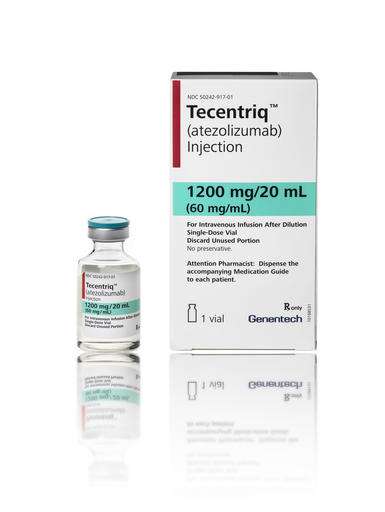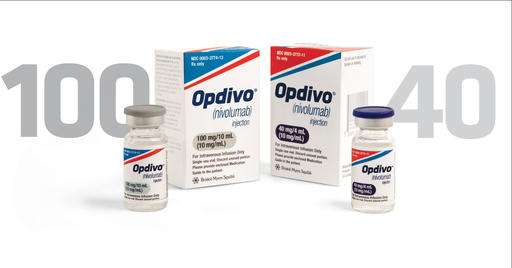FDA OKs immunotherapy drugs for bladder, blood cancers (Update)

U.S. regulators have approved the first drug for bladder cancer that harnesses the body's immune system, the first major advance in three decades against the most common type of bladder cancer.
Tecentriq won accelerated approval Wednesday from the Food and Drug Administration for treating patients with advanced urothelial cancer after chemotherapy stops helping them—a point when most usually die within about six months.
Such conditional approval is granted based on promising initial test results for disorders where patients have few or no options. Testing on many more patients to confirm the early results, which is required to obtain full approval from the FDA, is in progress.
Tecentriq, developed by the Roche Group's Genentech unit, blocks a protein found on many tumor cells that deactivates T-cells, the key immune-system cells that hunt down and destroy cancer cells.
A similar drug from Bristol-Myers Squibb Co., Opdivo, was approved by the FDA late Tuesday for treating Hodgkin lymphoma—the fourth cancer type for which it's been approved in the U.S.
Both drugs are part of a promising new class of injected cancer medicines that work with the patient's own immune system, helping it find and kill tumor cells that might otherwise multiply by using mechanisms to hide from immune-system sentinels. Drugmakers are racing to develop such drugs to fight a range of deadly cancers, and some of the new drugs have brought the first significant improvements in patient survival in decades. In many hard-to-treat cancers, new drugs that extend survival just a few months for some patients are considered a big advance.
Most bladder cancer patients for whom chemotherapy fails die within about six months on average, according to Dr. Daniel Chen, Genentech's head of development for so-called cancer immunotherapy drugs. Chen said in an interview that some patients given Tecentriq in clinical testing are alive as long as three years after starting treatment.
The tests on which Tecentriq's approval are based included 310 people with advanced urothelial cancer, which occurs in the bladder and sometimes in the ureter, urethra and pelvis. The testing found 15 percent of the patients had their tumors shrink, with that benefit lasting about 2 months to 14 months. In the subset of patients found to have high levels of the protein that Tecentriq targets, called PD-L1, 26 percent had their tumors shrink. Tumors completely vanished in nearly 6 percent of the patients tested, and in 12 percent of those with high levels of the PD-L1 protein.
Those patients are still being followed, and many continue to do well.
Chen noted that unlike chemotherapy, which often causes disabling nausea and other serious side effects, patients suffered far less-severe side effects while on Tecentriq. Those ranged from various infections and fatigue to intestinal blockages and blood clots.

"Many of these patients go back to work" during treatment, Chen said. "They're able to experience a normal quality of life."
Chen said the additional study results also will be aimed at getting approval for using Tecentriq for newly diagnosed patients.
Bladder cancer is the fifth-most common type, and strikes far more men than women. There are about 77,000 new cases and 16,400 deaths per year in the U.S., according to the National Cancer Institute.
Tecentriq, known chemically as atezolizumab, has a list price of $12,500 per month, without insurance. It's a biologic drug, meaning it's manufactured in living cells rather than by missing chemicals in vats. Genentech said it will be available in one to two weeks.
Bristol-Myers Squibb's Opdivo also works by harnessing immune-system cells. The FDA granted accelerated approval based on patient tests showing that 7 percent of patients given Opdivo had their tumors disappear. Another 58 percent of patients had their tumors shrink or stop growing.
Opdivo already is approved for treating patients with advanced cases of melanoma, lung and kidney cancer. The drug's sales are growing rapidly with each additional approval and hit $704 million in the January-March quarter.
Opdivo的标价约为每月12900美元on average. That can vary because the dosage is based on the patient's weight.
Bristol-Myers and Roche both provide financial assistance for patients who can't afford the drugs.
© 2016 The Associated Press. All rights reserved.













